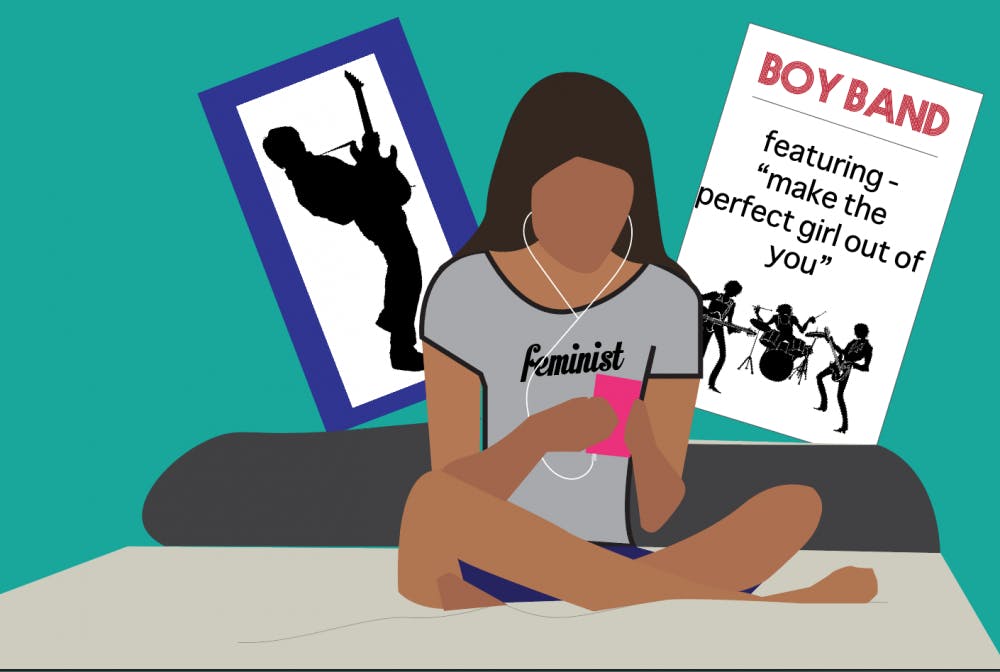I am a 20-year-old woman. I have a One Direction poster on the wall of my home bedroom and a Harry Styles pillow on my window sill.
I love boy bands and always have. But I am often disturbed by boy band misogyny: the subtle objectification of women by groups of male pop stars.
I often grapple with my feminism and my fandom. While it often leaves me conflicted, I know that it is okay, and it doesn’t make me any less of a feminist to squeal over a guy crooning about being friendzoned.
We can still enjoy our favorite things, but to be educated consumers, it is crucial that we examine them for problematic themes.
As a feminist, few things disturb me more than sexual objectification and entitlement toward women and their bodies. This is a huge theme in a lot of boy band music, where curly-haired crooners whine about wanting a girl who is uninterested or dating someone else.
This theme exists in “I Would” by One Direction,” “Cheaters” by The Vamps, "Just Friends" by the Jonas Brothers and “Try Hard” by 5 Seconds of Summer — some of my favorite songs! How can I enjoy something that promotes ideas that I hate so much?
One Direction's “Little White Lies” is all about ignoring a girl’s words under the guise that she really wants something else, including the questionable lyrics, “You wanna make some rules now, cool, then let’s watch them break tonight.” Their hit single “Steal My Girl” treats women like property to be whisked away at a moment’s notice despite her own wishes.
According to psychologists, misogyny often involves treating women like targets or caring little for their wishes, a common theme in pop music.
Read more about objectification of women in pop music by clicking here.
There’s even a Tumblr list of celebrities and all the racist, sexist, homophobic or otherwise prejudiced things they have done. At first I was offended that so many of my idols were on the list, until I read through it and felt more educated about issues like cultural appropriation and inclusivity. The site also includes tips on enjoying an artist’s work while recognizing their more problematic aspects.
So what does this mean? Are we doomed to a life of fist bumping along to a catchy song with a guilty cringe on our faces?
Rachel Reinke, a women’s studies professor at ASU, said that it isn’t personal when our favorite artists are problematic.
“It’s not that individual actions make them bad people,” she said. “It’s part of this larger system they’re trying to get ahead in.”
The culture we consume matters because the effects they have are real. For example, objectification can lead women to anxiety, depression and eating disorders. It should be difficult to support anything that even remotely condones misogyny.
But we also can’t go our entire lives hating everything that comes our way. Nothing is perfect, and everything is problematic in some way. Show me a movie with great racial diversity and I’ll point out the lack of dynamic female characters. A show may have a good representation of gay or trans characters, but they may all be white.
It is worth it to be aware of these things. Now I listen to pop music with a more critical ear. I can enjoy a song that regards women in less-than-perfect ways, as long as I stand up against misogyny in everyday life.
You can enjoy a violent video game as long as you don’t replicate violence in your own life. Once you realize your favorite show has all white characters, maybe you can seek out media with more diverse casts.
Issues like gender — and the gender roles and expectations depicted in media — may be especially difficult to confront.
“People get really heated about gender policing,” Reinke said. “Either they don’t like thinking about that or they are in denial that they ever were [gender-policed].”
It is difficult to critique our favorite things because we see ourselves in the public figures we admire. But part of being an adult is holding ourselves accountable by examining how we treat others and the media we support.
If you want to boycott something you find too disturbing, it’s okay to draw a line. (Chris Brown used to be one of my favorite artists, but since learning about his violence against women, it’s difficult for me to spend money on his music.)
It’s all about learning, improving and trying to get it right as best as you can.
Reach the columnist at lallnatt@asu.edu or follow @LibbyAllnattASU on Twitter.
Like The State Press on Facebook and follow @statepress on Twitter.
Editor’s note: The opinions presented in this column are the author’s and do not imply any endorsement from The State Press or its editors.
Want to join the conversation? Send an email to opiniondesk.statepress@gmail.com. Keep letters under 300 words and be sure to include your university affiliation. Anonymity will not be granted.




